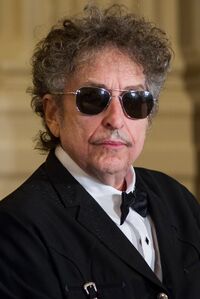Bob Dylan
Relevance
Mentioned In
- The Morrissey Covers Album - Release Information (December 5, 2018)
- California Son
- In Conversation With Morrissey - Gabfest (April 3, 2023)
Writer
Discogs Information
Profile
Born: May 24, 1941, Duluth, Minnesota, USA; singer, songwriter, "song and dance man". Inducted into Songwriters Hall of Fame in 1982 and the Rock And Roll Hall of Fame in 1988 (Performer). Winner of the 2016 Nobel Prize in literature. His first marriage was to Sara Dylan (November 1965 - divorced June 1977), together they have five children, including Jesse Dylan and Jakob Dylan. His second marriage was to Carolyn Dennis (4 June 1986 - divorced 7 August 1990).
External Links
- https://www.discogs.com/artist/59792-Bob-Dylan
- http://www.bobdylan.com/
- https://www.facebook.com/bobdylan/
- https://twitter.com/bobdylan
- https://myspace.com/bobdylan/
- http://www.thebobdylanfanclub.com/
- https://en.wikipedia.org/wiki/Bob_Dylan
- https://www.youtube.com/channel/UCBqkojCXby4zGkWX86FEY7Q
- http://www.10538overture.dk/Related%20bands/Bob%20Dylan/Fronts/bob_dylan_history.html
- https://searchingforagem.com/
Wikipedia Information
 |
Bob Dylan (legally Robert Dylan; born Robert Allen Zimmerman, May 24, 1941) is an American singer-songwriter. Considered one of the greatest songwriters of all time, Dylan has been a major figure in popular culture over his 60-year career. He rose to prominence in the 1960s, when songs such as "Blowin' in the Wind" (1963) and "The Times They Are a-Changin'" (1964) became anthems for the civil rights and antiwar movements. Initially modeling his style on Woody Guthrie's folk songs, Robert Johnson's blues and what he called the "architectural forms" of Hank Williams's country songs, Dylan added increasingly sophisticated lyrical techniques to the folk music of the early 1960s, infusing it "with the intellectualism of classic literature and poetry". His lyrics incorporated political, social, and philosophical influences, defying pop music conventions and appealing to the burgeoning counterculture. Dylan was born and raised in St. Louis County, Minnesota. Following his self-titled debut album of traditional folk songs in 1962, he made his breakthrough with The Freewheelin' Bob Dylan (1963). The album featured "Girl from the North Country" and "A Hard Rain's a-Gonna Fall", which adapted the tunes and phrasing of older folk songs. He released the politically charged The Times They Are a-Changin' and the more lyrically abstract and introspective Another Side of Bob Dylan in 1964. In 1965 and 1966, Dylan drew controversy among folk purists when he adopted electrically amplified rock instrumentation, and in the space of 15 months recorded three of the most influential rock albums of the 1960s: Bringing It All Back Home, Highway 61 Revisited and Blonde on Blonde. Dylan's move from acoustic folk and blues music to rock contributed to the development of folk rock, as his musical and lyrical output grew in complexity. His six-minute single "Like a Rolling Stone" (1965) expanded commercial and creative boundaries in popular music. In July 1966, a motorcycle accident led Dylan to cease touring. During this period, he recorded a large body of songs with members of the Band, who had previously backed him on tour. These recordings were later released as The Basement Tapes in 1975. In the late 1960s and early 1970s, Dylan explored country music and rural themes on John Wesley Harding (1967), Nashville Skyline (1969) and New Morning (1970). In 1975, he released Blood on the Tracks, which many saw as a return to form. In the late 1970s, he became a born-again Christian and released three albums of contemporary gospel music before returning to his more familiar rock-based idiom in the early 1980s. Dylan's Time Out of Mind (1997) marked the beginning of a career renaissance. He has released five critically acclaimed albums of original material since, most recently Rough and Rowdy Ways (2020). He also recorded a trilogy of albums covering the Great American Songbook, especially songs sung by Frank Sinatra, and an album smoothing his early rock material into a mellower Americana sensibility, Shadow Kingdom (2023). Dylan has toured continuously since the late 1980s on what has become known as the Never Ending Tour. Since 1994, Dylan has published nine books of paintings and drawings, and his work has been exhibited in major art galleries. With an estimated figure of more than 125 million records sold, Dylan is one of the best-selling musicians of all-time. He has received numerous awards, including the Presidential Medal of Freedom, ten Grammy Awards, a Golden Globe Award and an Academy Award. Dylan has been inducted into the Rock and Roll Hall of Fame, Nashville Songwriters Hall of Fame and the Songwriters Hall of Fame. In 2008, the Pulitzer Prize Board awarded him a special citation for "his profound impact on popular music and American culture, marked by lyrical compositions of extraordinary poetic power." In 2016, Dylan was awarded the Nobel Prize in Literature.
